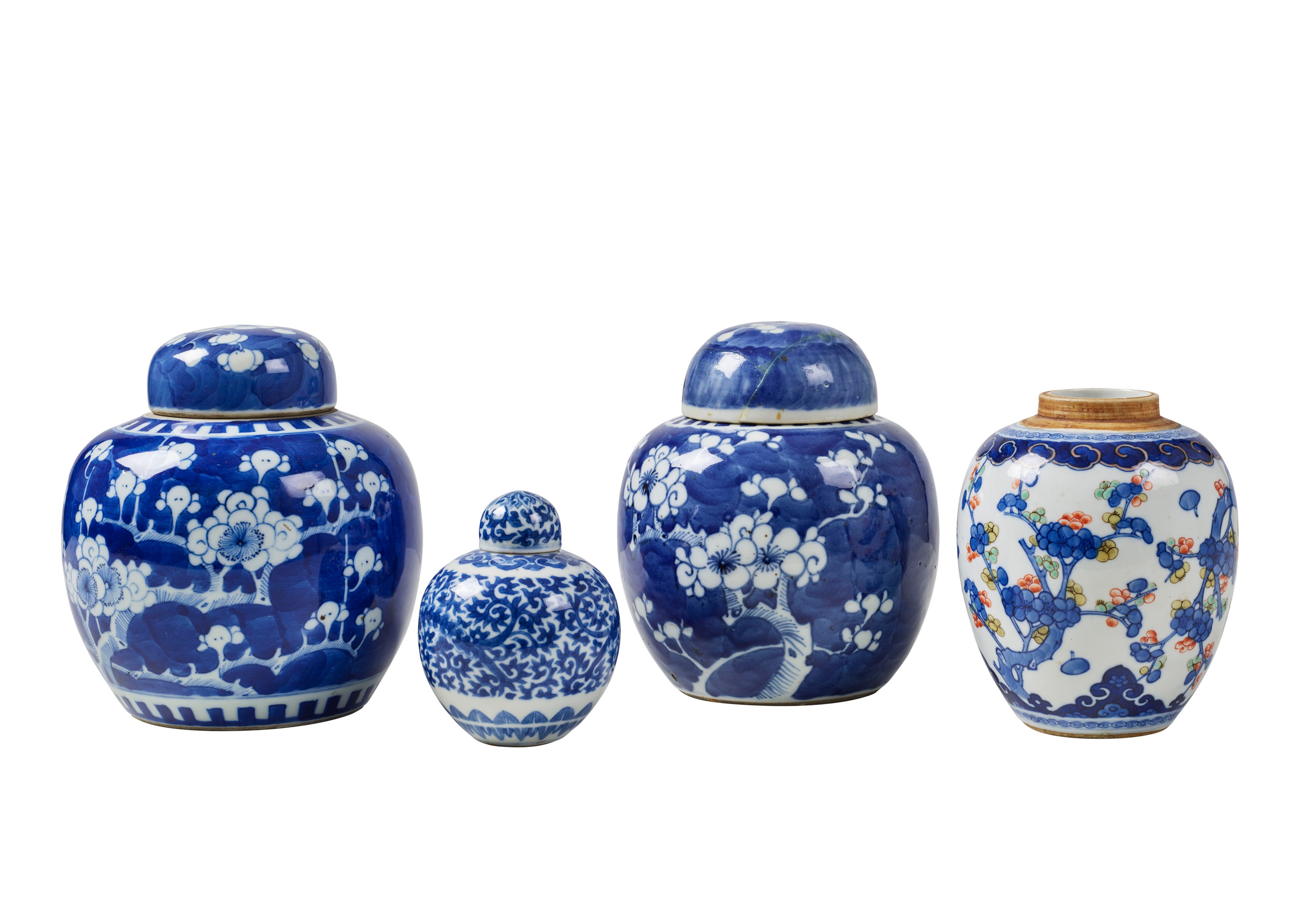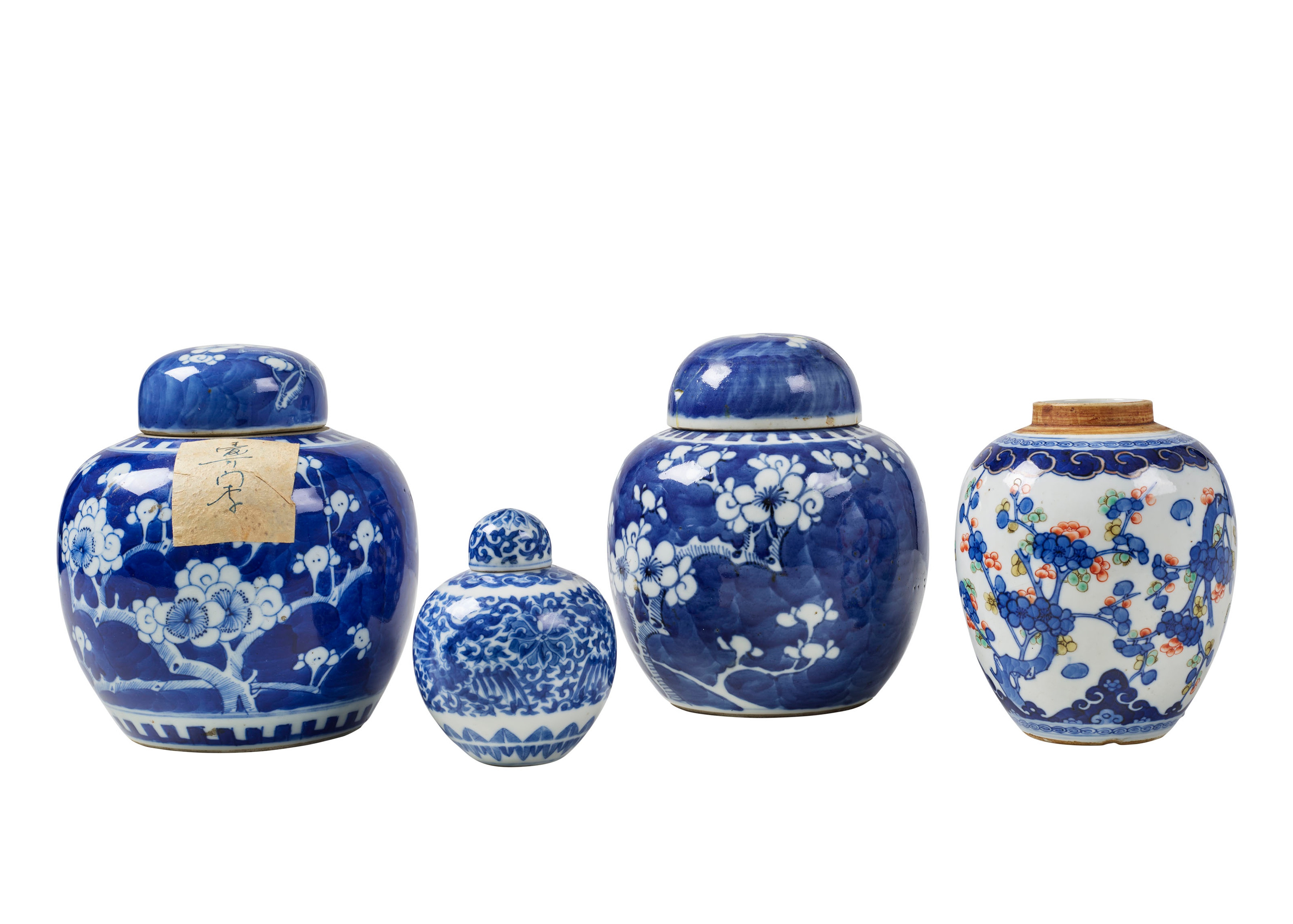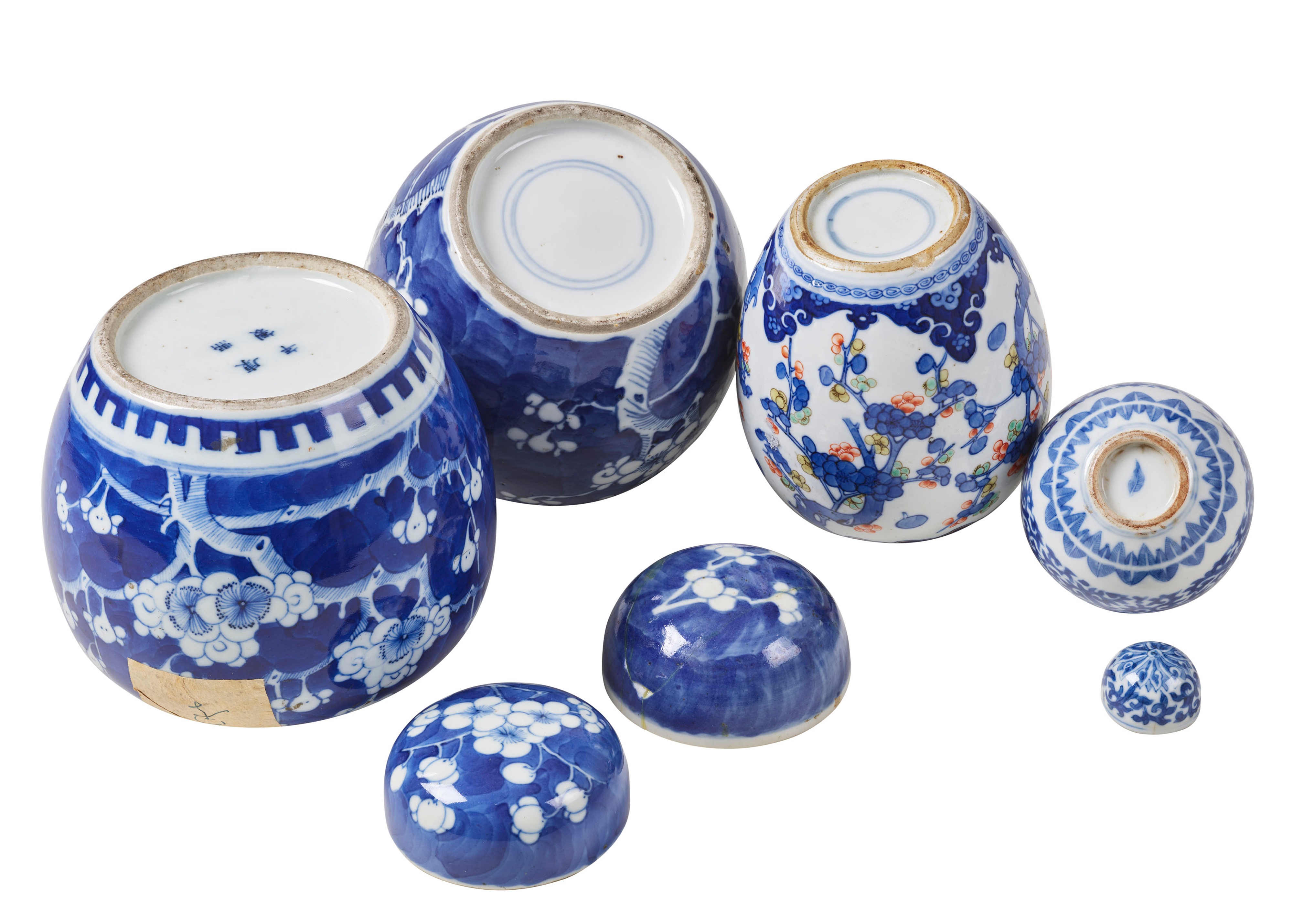1614
Ensemble de 4 pots à gingembre en porcelaine, Chine, XIX-XXe s.: 2 au décor en bleu de pruniers, don
Ensemble de 4 pots à gingembre en porcelaine, Chine, XIX-XXe s.: 2 au décor en bleu de pruniers, dont un à la marque au double cercle sous la base et un à la marque Kangxi (fêlure sur le couvercle de l'un, couvercle de l'autre restauré), 1 orné de pruniers et frises de motifs géométriques, marque au double cercle sous la base (couvercle manquant), 1 petit au décor en bleu de phœnix parmi des rinceaux, marque à la feuille d'armoise sous la base (fêlure sur le couvercle), tailles diverses, h. 15 cm max (fêlures et restaurations)
Provenance: collection Li Ai Vee (1932-2021), chalet Yu-Lan
A collection of 4 porcelain ginger pot, China, 19th-20th century: 2 decorated with plum trees, one with a double circle mark under the base and one with a Kangxi mark (hairline on the cover of one, the other cover restored), 1 ornated with plum trees and geometric pattern friezes, double circle mark under the base (missing cover), 1 small decorated in blue, wormwood leaf mark under the base (hairline on the lid), various sizes, maximum 15 cm high (hairlines and restorations)
Provenance: Li Ai Vee collection (1932-2021), Yu-Lan chalet
四件十九世紀到二十世紀瓷器罐
有些裂紋和已經過修復
來自李愛維收藏 (1932-2021), 玉蘭木屋
Condition
Usure générale des surfaces
Quelques imperfections de cuisson
Fêlures
Restaurations
Quelques éclats
Quelques rayures de surface
1 des plus grands pots avec étiquette sur le corps
Overall wear to the surfaces
Some firing imperfections
Cracks
Restorations
A few chips
Some surface scratches
1 of the largest pots with label on body
Provenance
La Maison Piguet est honorée de vous présenter la troisième partie de la collection de Madame Li Ai Vee (李爱维, née Eva Anita Li, 1932-2021), peintre sino-allemande établie en Suisse et fervente collectionneuse d’art asiatique, principalement chinois et japonais.
Née à Shanghai, Li Ai Vee, initiée dès l’enfance à la peinture par sa mère elle-même artiste, devient ensuite l’élève de prestigieux peintres, à savoir Lin Fengmian (1900-1991) et Lu Yifei (1908-1997) dans les années 50. Elle séjourne ensuite quelques années au Japon, où elle fut disciple du maître zen Rinzai Yamada Mumon Rôshi (1900-1988). Là-bas, elle fut sélectionnée en 1954 pour exécuter des peintures de bambou sur les portes coulissantes du Mémorial d’Hiroshima.
En 1958, Li Ai Vee quitte la Chine et s’installe en Suisse, à Zurich. En 1965, elle reçoit la médaille de la Ville de Paris, en reconnaissance de son art. Elle rencontre Zhang Daqian (Chang Dai-Chien, 1899-1983) la même année, et devient l’élève de ce peintre internationalement connu.
En 1973, Li Ai Vee s’installe à Blonay dans le chalet “Yu-Lan” (玉蘭, “Magnolia”), chalet entouré d’une vaste forêt de bambous et gardé par des chiens de Fô sculptés. C’est là-bas qu’elle peint, entourée de son importante collection d’art asiatique qu’elle étoffe au fil des années. Li Ai Vee a su rassembler un ensemble d’objets riche et varié mêlant vases monochromes, peintures et albums, objets de lettrés, jades sculptés et divinités du panthéon asiatique, le tout côtoyant en toute harmonie ses propres peintures.
L’entièreté de la collection peut être retrouvée en indiquant sur notre site le mot-clé “Li Ai Vee” dans la barre de recherche
La suite des objets de Li Ai Vee seront présentés dans notre future vente de juin 2025.
Piguet auction house is honoured to present the third part of the collection of Li Ai Vee (李爱维, born Eva Anita Li, 1932-2021), a Chinese-German painter living in Switzerland and a fervent collector of Asian art, mainly Chinese and Japanese.
Born in Shanghai, Li Ai Vee was introduced to painting as a child by her mother, herself an artist, and went on to become a pupil of prestigious painters such as Lin Fengmian (1900-1991) and Lu Yifei (1908-1997) in the 1950s. She then spent several years in Japan, where she was a disciple of the Zen master Rinzai Yamada Mumon Rôshi (1900-1988). There, in 1954, she was selected to paint several bamboos on the sliding doors of the Hiroshima Memorial.
In 1958, Li Ai Vee left China and settled in Zurich, Switzerland. In 1965, she met Zhang Daqian (Chang Dai-Chien, 1899-1983), and became a pupil of this internationally renowned painter. That same year, she was awarded the Medal of the City of Paris in recognition of her art.
In 1973, Li Ai Vee moved to Blonay to the chalet ‘Yu-Lan’ ( 玉蘭 , ‘Magnolia’), surrounded by a vast bamboo forest and guarded by carved Foo lions. It was there that she painted, surrounded by her extensive collection of Asian art, which she has enriched over the years. Li Ai Vee has put together a rich and varied collection of objects, combining monochrome vases, paintings and albums, scholarly objects, carved jades and divinities from the Asian pantheon, all of which she has combined with her passion for art.
The entire collection can be found by entering the keyword ‘Li Ai Vee’ in the search bar on our website.
The third and fourth parts of Li Ai Vee's collection will be presented in our future sale in June 2025.
Ensemble de 4 pots à gingembre en porcelaine, Chine, XIX-XXe s.: 2 au décor en bleu de pruniers, dont un à la marque au double cercle sous la base et un à la marque Kangxi (fêlure sur le couvercle de l'un, couvercle de l'autre restauré), 1 orné de pruniers et frises de motifs géométriques, marque au double cercle sous la base (couvercle manquant), 1 petit au décor en bleu de phœnix parmi des rinceaux, marque à la feuille d'armoise sous la base (fêlure sur le couvercle), tailles diverses, h. 15 cm max (fêlures et restaurations)
Provenance: collection Li Ai Vee (1932-2021), chalet Yu-Lan
A collection of 4 porcelain ginger pot, China, 19th-20th century: 2 decorated with plum trees, one with a double circle mark under the base and one with a Kangxi mark (hairline on the cover of one, the other cover restored), 1 ornated with plum trees and geometric pattern friezes, double circle mark under the base (missing cover), 1 small decorated in blue, wormwood leaf mark under the base (hairline on the lid), various sizes, maximum 15 cm high (hairlines and restorations)
Provenance: Li Ai Vee collection (1932-2021), Yu-Lan chalet
四件十九世紀到二十世紀瓷器罐
有些裂紋和已經過修復
來自李愛維收藏 (1932-2021), 玉蘭木屋
Condition
Usure générale des surfaces
Quelques imperfections de cuisson
Fêlures
Restaurations
Quelques éclats
Quelques rayures de surface
1 des plus grands pots avec étiquette sur le corps
Overall wear to the surfaces
Some firing imperfections
Cracks
Restorations
A few chips
Some surface scratches
1 of the largest pots with label on body
Provenance
La Maison Piguet est honorée de vous présenter la troisième partie de la collection de Madame Li Ai Vee (李爱维, née Eva Anita Li, 1932-2021), peintre sino-allemande établie en Suisse et fervente collectionneuse d’art asiatique, principalement chinois et japonais.
Née à Shanghai, Li Ai Vee, initiée dès l’enfance à la peinture par sa mère elle-même artiste, devient ensuite l’élève de prestigieux peintres, à savoir Lin Fengmian (1900-1991) et Lu Yifei (1908-1997) dans les années 50. Elle séjourne ensuite quelques années au Japon, où elle fut disciple du maître zen Rinzai Yamada Mumon Rôshi (1900-1988). Là-bas, elle fut sélectionnée en 1954 pour exécuter des peintures de bambou sur les portes coulissantes du Mémorial d’Hiroshima.
En 1958, Li Ai Vee quitte la Chine et s’installe en Suisse, à Zurich. En 1965, elle reçoit la médaille de la Ville de Paris, en reconnaissance de son art. Elle rencontre Zhang Daqian (Chang Dai-Chien, 1899-1983) la même année, et devient l’élève de ce peintre internationalement connu.
En 1973, Li Ai Vee s’installe à Blonay dans le chalet “Yu-Lan” (玉蘭, “Magnolia”), chalet entouré d’une vaste forêt de bambous et gardé par des chiens de Fô sculptés. C’est là-bas qu’elle peint, entourée de son importante collection d’art asiatique qu’elle étoffe au fil des années. Li Ai Vee a su rassembler un ensemble d’objets riche et varié mêlant vases monochromes, peintures et albums, objets de lettrés, jades sculptés et divinités du panthéon asiatique, le tout côtoyant en toute harmonie ses propres peintures.
L’entièreté de la collection peut être retrouvée en indiquant sur notre site le mot-clé “Li Ai Vee” dans la barre de recherche
La suite des objets de Li Ai Vee seront présentés dans notre future vente de juin 2025.
Piguet auction house is honoured to present the third part of the collection of Li Ai Vee (李爱维, born Eva Anita Li, 1932-2021), a Chinese-German painter living in Switzerland and a fervent collector of Asian art, mainly Chinese and Japanese.
Born in Shanghai, Li Ai Vee was introduced to painting as a child by her mother, herself an artist, and went on to become a pupil of prestigious painters such as Lin Fengmian (1900-1991) and Lu Yifei (1908-1997) in the 1950s. She then spent several years in Japan, where she was a disciple of the Zen master Rinzai Yamada Mumon Rôshi (1900-1988). There, in 1954, she was selected to paint several bamboos on the sliding doors of the Hiroshima Memorial.
In 1958, Li Ai Vee left China and settled in Zurich, Switzerland. In 1965, she met Zhang Daqian (Chang Dai-Chien, 1899-1983), and became a pupil of this internationally renowned painter. That same year, she was awarded the Medal of the City of Paris in recognition of her art.
In 1973, Li Ai Vee moved to Blonay to the chalet ‘Yu-Lan’ ( 玉蘭 , ‘Magnolia’), surrounded by a vast bamboo forest and guarded by carved Foo lions. It was there that she painted, surrounded by her extensive collection of Asian art, which she has enriched over the years. Li Ai Vee has put together a rich and varied collection of objects, combining monochrome vases, paintings and albums, scholarly objects, carved jades and divinities from the Asian pantheon, all of which she has combined with her passion for art.
The entire collection can be found by entering the keyword ‘Li Ai Vee’ in the search bar on our website.
The third and fourth parts of Li Ai Vee's collection will be presented in our future sale in June 2025.
ONLINE (1604 à 1827) - Arts d'Orient
Ends from
Venue Address
Important Information
REMISE DES LOTS : Vendredi 21 mars - 11h - 17h Samedi 22 mars - 10h - 14h Lundi 24 mars - 11h - 17h












